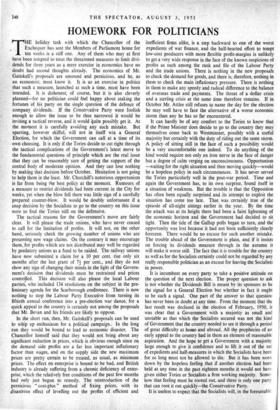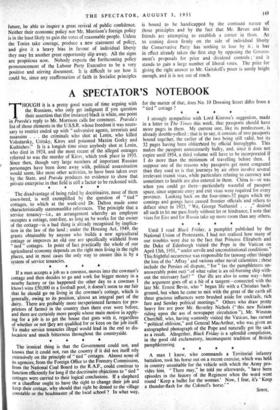HOMEWORK FOR POLITICIANS
HE holiday task with which the Chancellor of the Exchequer has sent the Members of Parliament home for ten weeks is a stiff one. Any of them who may at first have been tempted to treat the threatened measures to limit divi- dends for three years as a mere exercise in, economics have no doubt had second thoughts already. The economics of Mr. Gaitskell's proposals are unsound and pernicious, and he, as an economist, must know it. It is as an exercise in politics that such a measure, launched at such a time, must have been intended. It , is dishonest, of course, but. it is also cleverly planned—for no politician could feel happy about staking the fortunes of his party on the single question of the defence of company dividends. If the Conservative Party were foolish enough to allow the issue to be thus narrowed it would be inviting a tactical reverse, and it would quite possibly get it. At the moment it is carefully avoiding any such mistake. But sparring, however skilful, will not in itself win a General Election, for which the Government can call at a time of its own choosing. It is only if the Tories decide to cut right through the tactical complications of the Government's latest move to the fundamental questions of principle which are the real issue that they can be reasonably sure of getting the support of the central body of moderate opinion. And they can lose nothing by making that decision before October. Hesitation is not going to help them in the least. Mr. Churchill's notorious opportunism is far from being the best policy at the moment. Rumours of a measure to restrict dividendS had been current in the City for weeks, yet when the blow fell there was little sign of a carefully prepared counter-blow. It would be doubly unfortunate if a snap decision by the Socialists to go to the country on this issue were to find the Tories 'still on the defensive.
The tactical reasons for the Government's move are fairly clear. It will please the trade unions, who have never ceased to call for the limitation of profits. It will not, on the other hand, seriously check the growing number of unions who are presenting new wage claims. On the contrary it may encourage them, for profits which, are not distributed may well be regarded by predatory unions as a fund to be raided. The railway unions have now submitted a claim for a 10 per cent. rise only six months after the last grant of 71. per cent., and they do not show any sign of changing their minds in the light of the Govern- ment's decision that dividends must be restrained and prices controlled. This decision will also please the local Labour parties, who included 134 resolutions on the subject in the pre- liminary agenda for the Scarborough conference. There is now nothing to stop the Labour Party Executive from turning its fiftieth annual conference into a pre-election war dance; for a quick appeal to the country is certainly not among the proposals that Mr. Bevan and his friends are likely to oppose.
In the short run, then,- Mr. Gaitskell's proposals can be used to whip up enthusiasm for a political campaign.. In the long run they would be. bound to lead to economic disaster. The Chancellor himself said that they would not bring about any significant reduction in prices, which is obvious enough since on the demand side profits are a far less important inflationary factor than wages, and on the supply side the new maximum prices are pretty certain to be treated, as usual, as minimum prices. The effect on enterprise is bound to be bad, and British industry is already suffering from a chronic deficiency of enter- prise, which the relatively free conditions of the past few months bad only just begun to remedy. The reintroduction of the pernicious " cost-plus " method of fixing prices, with its disastrous effect of levelling out the profits of efficient and inefficient firms alike, is a step backward to one of the worst expedients of war finance, and the half-hearted effort to tempt low-cost producers with more flexible profit-margins is unlikely to get a very wide response in the face of the known suspicions of profits as such among the rank and file of the Labour Party and the trade unions. There is nothing in the new proposals to check the demand for goods, and there is, therefore, nothing in them to check the main inflationary pressure. There is nothing in them to make any speedy and radical difference to the balance of overseas trade and payments. The threat of a dollar crisis and a sterling crisis at the same time therefore remains. If in October Mr. Attlee still refuses to name the day for the election he may well have to face the alternative of a worse economic storm than any he has so far encountered.
It can hardly be of any comfort to the Tories to •know that if' the Prime Minister does decide to go to the country they may themselves come back to Westminster, possibly with a useful majority but certainly with the duty of riding out the same storm. A policy of sitting still in the face of such a possibility would be a very uncomfortable one indeed. To do anything of the kind would require not only an iron nerve in the face of danger but a degree of calm verging on unconsciousness. Opportunism —waiting for the right situation and then moving quickly—would be a hopeless policy in such circumstances. It has never served the Tories particularly well in the post-war period. Time and again the Government has, to its own surprise; found itself in a situation of weakness. But the trouble is that the Opposition has often been equally surprised and its attempt to exploit the situation has come too late. That was certainly true of the episode of all-night sittings earlier in the year. By the time the attack was at its height there had been a faint lightening of the economic horizon and the Government had decided to sit tight. Then the tide of the Gallup polls began to turn, and the opportunity was lost because it had not been sufficiently clearly foreseen. There would be no excuse for such another mistake. The trouble ahead of the Government is plain, and if it insists on forcing its dividends measure through in the autumn it will make it worse still. The fact that it is trouble for the country as well as for the Socialists certainly could not be regarded by any really responsible politician as an excuse for leaving the Socialists in power.
It is incumbent on every party to take a positive attitude on the question of the next election. The proper question to ask is not whether the Dividends Bill is meant by its sponsors to be the signal for a General Election but whether in fact it ought to be such a signal. One part of the answer to that question has never been in doubt at any time. From the moment that the last result was declared in the election of February, 1950, it was clear that a Government with a majority as small and unstable as that which the Socialists secured was not the kind of Government that the country needed to see it through a period of great difficulty at home and abroad. All the prophecies of an early appeal to the country bad in them an element of reasonable aspiration. And the hope to get a Government with a majority large enough to give it confidence and to lift it out of the rut of expedients and half-measures in which the Socialists have been for so long must not be allowed to die: But it has been worn down by the hopeless feeling that if another election had been held at any time in the past eighteen months it would not have given either Tories or Socialists a firm working majority. Some- how that feeling must be rooted out, and there is only one party that can root it out quickly—the Conservative Party. It is useless to expect that the Socialists will, in the foreseeable future, be able to inspire a great revival of public confidence. Neither their economic policy nor Mr. Morrison's foreign policy is in the least likely to gain the votes of reasonable people. Unless the Tories take courage, produce a new statement of policy, and give it a heavy bias in favour of individual liberty they may let another great opportunity slip away. All the signs are propitious now. Nobody expects the forthcoming policy pronouncement of the Labour Party Executive to be a very positive and stirring document. It is difficult to see how it could be, since any reaffirmation of faith in Socialist principles is bound to be handicapped by the contused nature of those principles and by the fact that Mr. Bevan and his- friends are attempting to establish a corner in them. As to coming down firmly on the side of individual liberty the Conservative Party has • nothing to lose by it ; it has in effect already taken the first step by opposing the Govern- ment's proposals for price and dividend controls ; • and it stands to gain a large number of liberal votes. The prize for giving the right answer to Mr. Gaitskell's poser is surely bright enough, and it is not out of reach.































 Previous page
Previous page